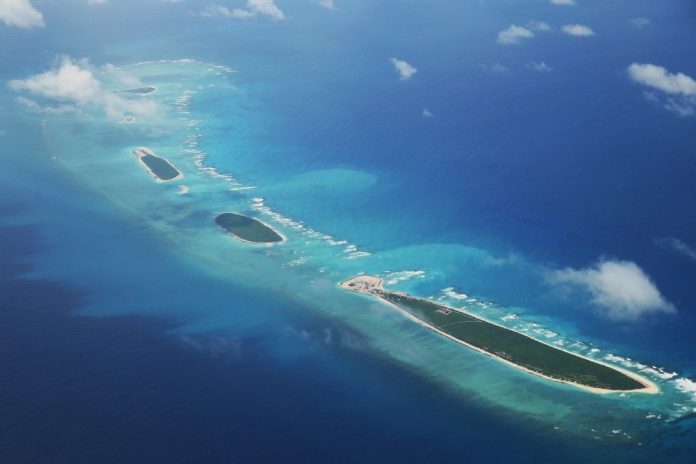The South China Sea is an extremely significant body of water in a geopolitical sense. It is the second most used seaway within the world, while in terms of world annual merchant fleet tonnage, over 50% passes through the Strait of Malacca, the Sunda Strait, and the Lombok Strait. Over 1.6 million m³ (10 million barrels) of crude oil each day are shipped through the Strait of Malacca where there are regular reports of piracy, but much less frequently than before the mid-20th century.
The region has proven oil reserves of around 1.2 km³ (7.7 billion barrels), with an estimate of 4.5 km³ (28 billion barrels) in total. Natural gas reserves are estimated to total around 7,500 km³ (266 trillion cubic feet). A 2013 report by the U.S. Energy Information Administration raised the entire estimated oil reserves to 11 billion barrels. In 2014 China began to drill for oil in waters disputed with Vietnam. The area in question is understood as Vanguard Bank and which Vietnam officials claim lies within their country’s 200-mile exclusive economic zone. China, however, disputes this fact.
According to studies made by the Department for Environment and Natural Resources, Philippines, this body of water holds one-third of the entire world’s marine biodiversity, thereby making it a very important area for the ecosystem. However the fish stocks in the area are depleted, and countries are using fishing bans as a means of asserting their sovereignty claims.
Indonesia’s maritime waters have been breached by fishing fleets from Vietnam and the Philippines leading to said ships being seized and sunk by Indonesian authorities.
China announced in May 2017 a breakthrough for mining methane clathrates, once they extracted methane from hydrates within the South China Sea

Relevance for China
It is estimated that the South China Sea may contain one-hundred and five billion barrels of hydrocarbon reserves. Thus, whoever controls and achieves sovereignty over the islands, reefs, and waters of the South China Sea, will have access to those huge energy reserves. Moreover, the Strait of Malacca is that the shortest sea route between African and Persian Gulf suppliers and Asian consumers.
For these reasons, it’s critical for China’s future energy security, to possess uncontested access to such hydrocarbon reserves and other resources. China’s economic process means it’s become the second-largest consumer of oil within the world and therefore the demand for energy in China is predicted to extend still further over the coming decades.
Around eighty percent of China’s oil imports, as well as a significant amount of its trade, pass through the South China Sea. Therefore, China’s control over the region will enable this maritime trade to pass to mainland China unfettered.
The South China Sea accounts for a really significant proportion of China’s annual fishing requirements. Thus, it is critical to China’s food security policy, to maintain unchallenged access to such sources of protein.
India’s Stakes
Even though India isn’t a lively player within the high-stakes jostle for the control of those waters, it’ll hardly remain an unaffected bystander just in case the facility structure there changes drastically. Nearly $200 billion worth of Indian trade passes through the South China Sea and thousands of its citizens study, work, and invest within the Association of Southeast Asian Nations (ASEAN) countries, China, Japan, and therefore the Republic of Korea. This makes it a neighborhood of high strategic necessity for India. If China comes to establish un-rivaled sway over these waters, that could upend a huge part of the existing trade and geopolitical setup. Access to the main waterways in Southeast Asia is a crucial consideration for Indian policymakers, as is that they got to build capacity in member states of the ASEAN. Both are central to New Delhi’s Indo-Pacific vision.
In other words, what happens within the South China Sea is extremely much India’s business too. It must find ways to play its cards right so that it can leverage these disputed waters when the time involves holding Beijing to account for its brazen border breaches and other transgressions.
It is unlikely that China will desist from its hard power projection. Whether or not China provokes further confrontation immediately, it’d test America’s resolve to face its Asian allies within the youth of the new U.S. administration. China’s contribution to global recovery since the crisis of 2007- 08 has been significant. It’s faltering, or falling prey to adventurist action within the South China Sea, which won’t be good for itself, the region, or the planet, including India.
Also, Read – Several websites including Paytm, Airbnb go down in the Edge DNS glitch





